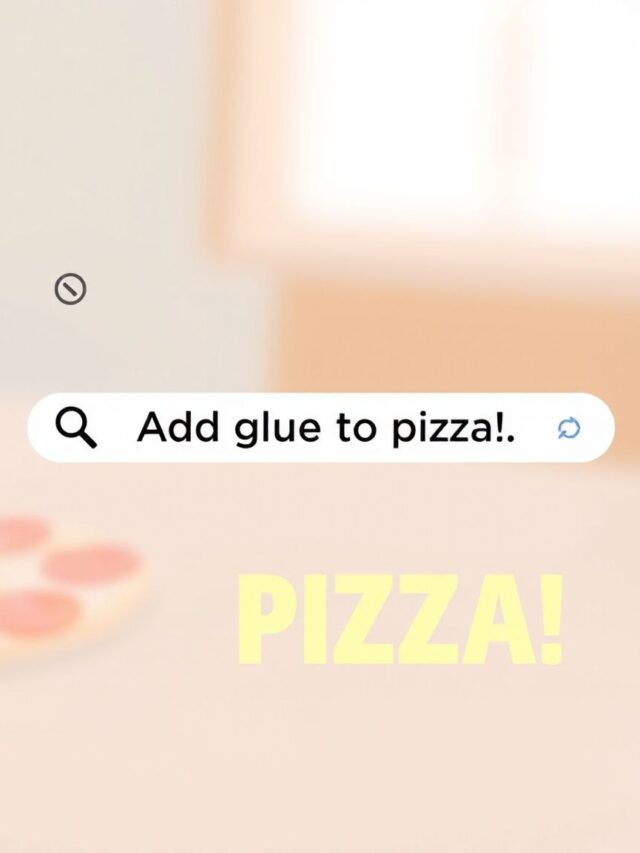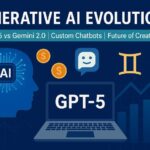Google’s AI Search Backfires: From Medical Misinformation to Pizza Glue—Is This the Future We Want?
What started as Google’s bold leap into the future of AI-powered search has now turned into an online firestorm. With users reporting strange, misleading, and even dangerous results, the tech giant is under scrutiny like never before.
“Google Told Me to Eat Glue” – The Viral Moment That Sparked Global Concern
Earlier this week, a screenshot circulated across X (formerly Twitter) showing a Google AI Overview recommending that a user “add non-toxic glue to pizza sauce so it sticks better.” What looked like a joke turned out to be a real search result, generated by Google’s AI Overview—the flagship feature rolled out to redefine the way people use the world’s most popular search engine.
Within hours, more users started sharing their own bizarre experiences. Some were mildly amusing (“How many rocks should I eat?”), but others raised serious safety concerns. A few AI summaries reportedly offered inaccurate medical advice, misrepresented news, and even cited fictional Reddit posts as credible sources.

What Is Google AI Overview—and Why Is It So Important?
Launched during Google I/O 2024, the AI Overview is part of Google’s effort to integrate generative AI directly into its search engine. Instead of ten blue links, users get an instant summary at the top of the page—created using large language models (LLMs) trained on a vast pool of internet data.
Google marketed this as “the most helpful search experience yet,” aiming to give users direct answers without making them sift through websites. But as this week has shown, convenience may be coming at the cost of accuracy, safety, and trust.
The Real-World Risks of AI Hallucination
While the pizza-glue joke went viral, healthcare professionals are raising red flags over more serious implications.
“I searched for what to do if someone has a heart attack,” one Redditor posted, “and the AI Overview told me to make them drink water and lie down. That’s potentially fatal advice.”
This kind of AI hallucination—where the model confidently generates false or misleading information—is not new. But what makes it dangerous here is Google’s brand trust. Users are more likely to believe what they read if it comes from Google than, say, ChatGPT or Reddit.
As Dr. Anjali Mehra, a Delhi-based physician, explained:
“Patients Google symptoms all the time. Now, if AI-generated answers appear as official-looking summaries, it creates a huge risk of self-misdiagnosis or dangerous treatments.”
Why Is Google’s AI Making These Mistakes?
At the core of the issue is how LLMs (Large Language Models) work. They don’t “understand” facts like humans do—they predict what text should come next based on patterns in data. This means:
- If incorrect data exists online (like a Reddit joke about glue pizza), the AI may surface it as fact.
- If nuanced context is needed (like in medical or legal queries), the AI may oversimplify or misrepresent it.
- If the question is open-ended or rare, the AI might “fill in the gaps” with guesses.
And despite Google’s claims of using additional safeguards, it seems the system is still prone to “authoritative hallucinations”—falsehoods stated in a confident, factual tone.
Public Trust in Search Results Is Eroding
The backlash has been swift. Tech influencers, educators, and even ex-Google employees have questioned the company’s decision to roll this out globally without enough real-world testing.
- Cory Doctorow, digital rights activist, called it: “a fundamental failure in how Big Tech prioritizes market competition over public responsibility.”
- The New York Times published an editorial titled “Google’s AI Is Not Ready for Prime Time.”
- Indian creators on Instagram and YouTube made reels mocking the “pizza glue” fail, racking up millions of views in 24 hours.
Clearly, this isn’t just a technical glitch—it’s a reputational crisis.
Google’s Response: “We’re Improving Fast”
In an official statement, Google said:
“We’ve seen isolated examples where the AI Overview doesn’t meet our standards. We’re using this feedback to make rapid improvements.”
They also mentioned they had “trained the system not to repeat satirical content” and had already taken steps to remove the pizza-glue suggestion from future results.
But critics say the real issue isn’t just about fixing bugs—it’s about transparency. Users have no way of knowing which sources the AI pulled from, how trustworthy they are, or how often these hallucinations occur.
What Should Users Do?
Until things stabilize, here are some tips for safe AI search use:
- Always cross-check critical information, especially related to health, finance, or law.
- If the AI result seems odd, scroll down and check the traditional links too.
- Prefer official sources (govt sites, medical institutions, news portals) for factual accuracy.
- Report incorrect results to Google directly—user feedback helps tune the AI.
The Bigger Question: Are We Ready for AI-Powered Search?
The irony here is that Google wanted to combat misinformation by summarizing it—only to amplify it instead. This episode underlines a larger problem with AI deployment today: we’re moving faster than our ability to regulate, test, or even understand these tools fully.
As one engineer posted:
“It’s like letting a self-driving car go live without teaching it what red lights mean.”
The Bottom Line
Google’s AI Overview was supposed to make search better. Instead, it’s left many wondering if they can trust what they see. From glue-filled pizzas to misleading medical tips, the tool shows that even the smartest AI can fall flat—especially when rushed to market.
As we stand at the intersection of innovation and safety, this may be the reminder we all needed: just because AI can answer doesn’t mean it always should.
read this also:-
AI Deepfake Scam Steals ₹200 Crore – Are YOU Next?
Best AI Tools for Content Creators in 2025: From Idea to Viral Post in 5 Minutes
Leaked: Upcoming AI Features from Google, Microsoft & OpenAI in 2025
Hi, I’m Santu Kanwasi, a passionate blogger with over 2 years of experience in content writing and blogging. I create original, informative, and engaging articles on a wide range of topics including news, trending updates, and more. Writing is not just my profession—it’s my passion. I personally research and write every article to ensure authenticity and value for my readers.
Whether you’re looking for fresh perspectives or reliable updates, my blog is your go-to source!






